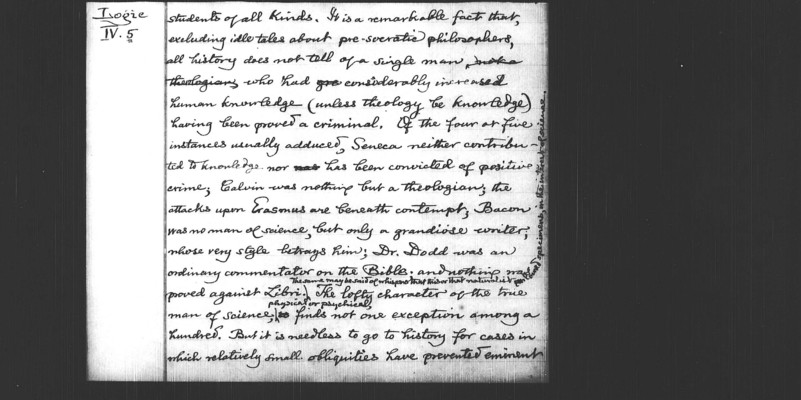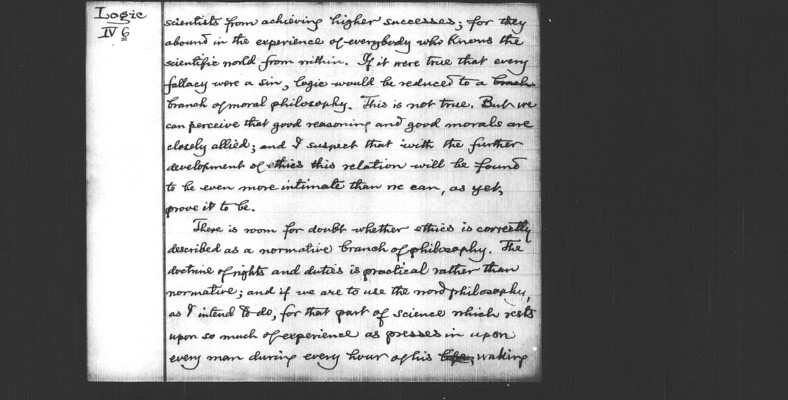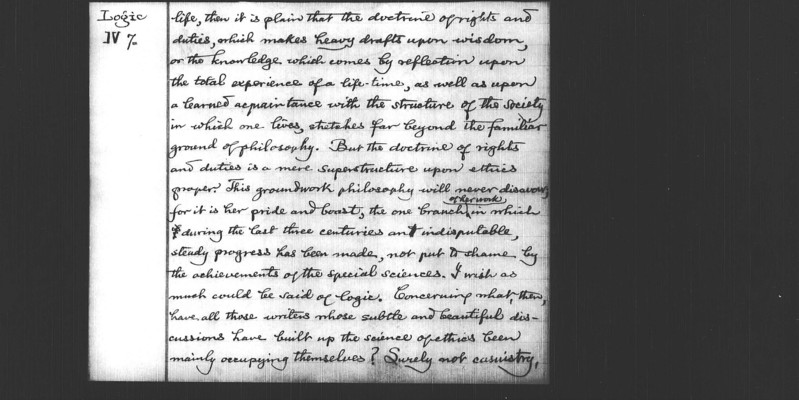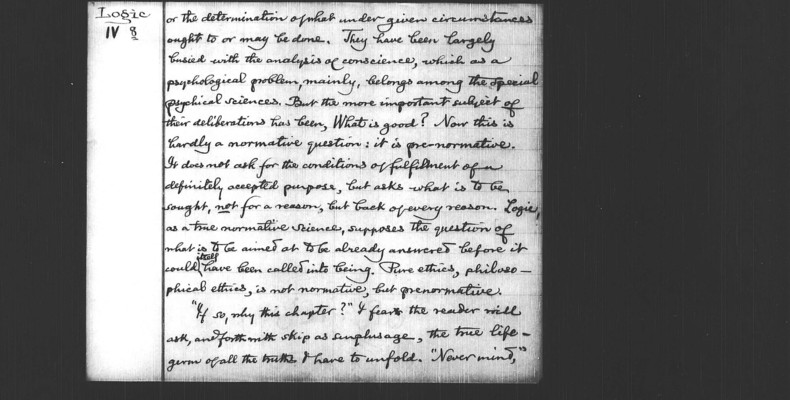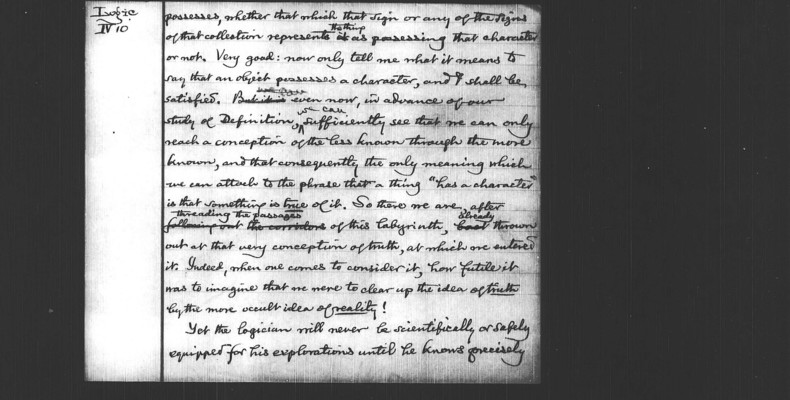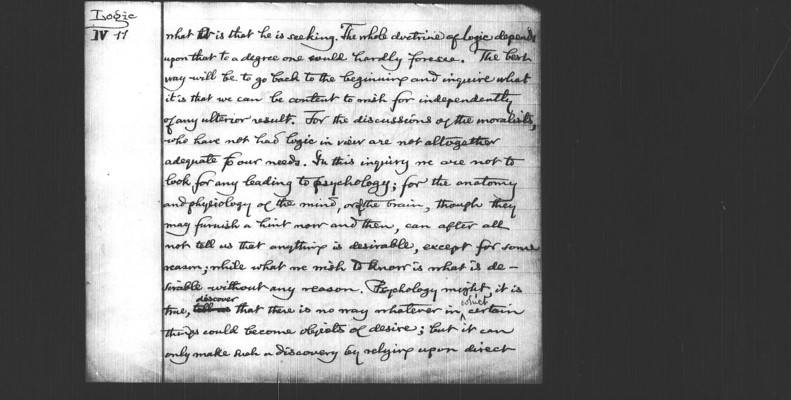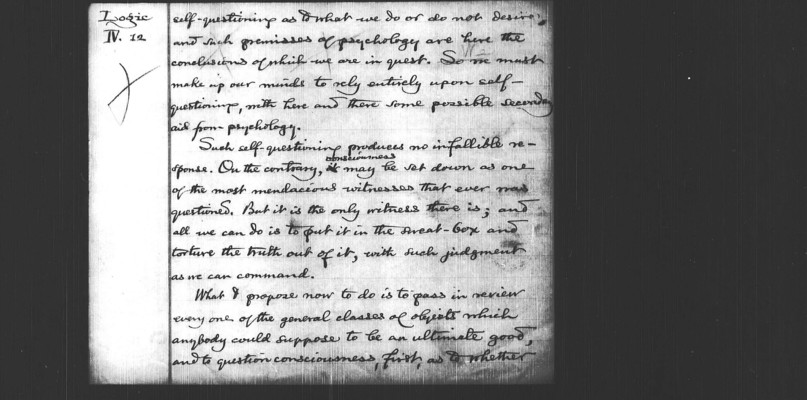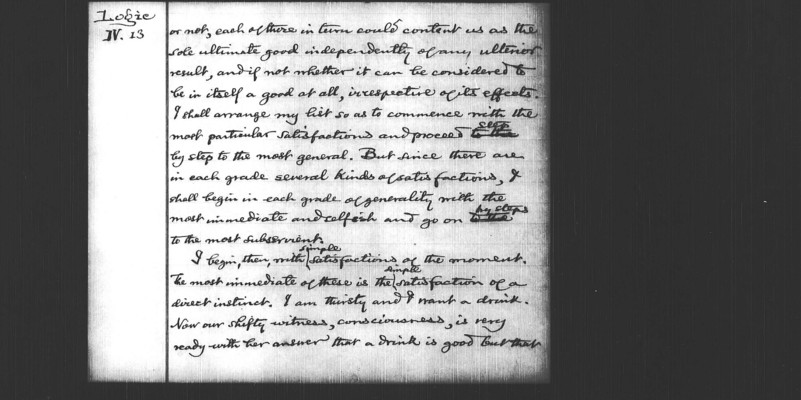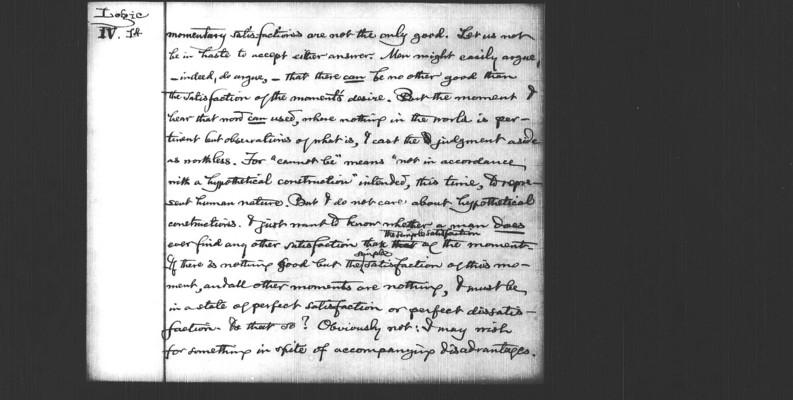Pages That Need Review
MS 433 (1902) - Minute Logic - Chapter IV
5
Logic IV. 5 student of all kinds. It is a remarkable fact that exluding idle tales about pre-socratic philosophers, all history does not tell of a single man who had considerably increased human knowledge (unless theology be knowledge) having been proved a criminal. Of the four or five instances usually adduced, Seneca neither contributed to knowledge nor has been conviced of positive crime; Calvin was nothing but a theologian; the attacks upon Erasmaus are beneath contempt; Back was no man of science, ut only a grandiose writer, whose very stle betrays him; Dr. Dodd was an ordinary commentator on the Bilble; and nothing was proved against Libri. The same may be said of whispers that is or that naturalist owned specimen, in the interest of science. The lofty character of the true man of science physical or psychical, finds not one exception among a hundred. But is is needless to go to history for cases in which relatively small obliquities have prevented eminent
6
Logic IV 6 scientist from achieving higher successes; for they abound int he experience of everybody who knows the scientific world from within. If it were true that every fallacy were a sin, logic would be reduced to a branch of moral philosophy. This is not true. But we can receive that good reasoning and good morals are closely aliled; and I suspect that with the further development of ethics this relation will be found to be even more intimate than we can, as yet, prove it to be. There is room for doubt whether ethics is correctly described as normative branch of philosophy. The doctrine of rights and duties is practical rather than normative; and if we are to use the word philosophy, as I intend to do, for that part of science which rests upon so much of expericne as [posesses?] in upon every amn during every hour of his waking
7
Logic IV 7 life, then it is plain that the doctrine of rights and duties, which makes heavy drafts upon wisdon, or the knowledge which comes by reflection upon the total experience of a life-time, as well as upon a learned acquaintance with the structure of the society in which one lives, stretches far beyond the familiar ground of philosophy. But the doctrine of rights and duties is a mere superstructure upon ethics prosper. This groundwork philosoply will never disavour; for it is her pride and [boast], the one branch of her work in which during the last three centuriesan indisputable, steady progress has been made, nor put to shame by the achievements of the special sciences. I wish as much could be said of logic. Concerning what, then, have all those writers whose subtle and beautiful discussions have built up the science of ethics been mainly occupying themselvew? Surely [nor or not?] [casuistry?]
8
Logic IV 8 or the determination of what under given circumstances ought to or may be done. They have been largely busied with the analysis of conscience, which as a psychological problem, mainly, belongs among the special psychical sciences. But the more important subject of their deliverations has been, What is good? Now this is hardly a normative question: it is pre-normative. It does not ask for the conditions of fulfillment of a definitely accepted purpose, but asks what is to be sought, nor for a reason, but lack of every reason. Logic as a true normative science, supposes the questions of what is to be aimed at to be already answered before it could itself have been called into being. Pure ethics, philosophical ethics, is not normative, but prenormative. "If so only this chapter?' I fear the reader will ask, and [forth?] [with?] skip and [surplus?] age, the true life [germ?] of all the truths I have to unfold. "Nevermind,"
9
Logic IV 9 you will say, "whether the aim which logic has is vein is a good one, or not; as a matter of fact, we are interested in it. It is to learn the truth: no aim could be of more elementary simplicity. Let us turn to where we are told how to come to it. " Well, if this aim is so readily comprehensible, suppose you tell me, to whom it does not seem so, what truth consists in. "Truther is the conformity of a representation to its object," say Kant. One might make this statement more explicit; but for our present purpose it may pass. It is nearly correct, so far as it is intelligible. Only what is that "object" which serves to define truth? Why it is the reality: it is of such a naure as to be independent of representations of it, so that, taking any individual sign or any individual collection of signs (such, for example, as all the ideas that ever enter into a given man's head,) there is some character which that thing
10
Logic IV 10 possesses, whether that which that sign or any of the signs of that collection represents the things as possessing that character or not. Very good: now only tell me what it mean to say that an object possesses a character, and I shall be satisfied. Even now, in advance of our study of Definition we can sufficiently see that we can only reach a conception of the less known through the more known, and that consequently the only meaning which we can attach to the phrase that a thing "has a character" is that something is true of it. So there we are after the reading passages of this labyrinth, already thrown out at the very conception of the trught, at which we entered it. Indeed, when one comes to consider it, how futile it was to imagine that we were to clear up the idea of truth by the more occult idea of reality! Yet the logician will never be scientifically or safely equipped for his explorations until he knows precisely
11
Logic IV 11 what is that he is seeking. The whole doctrine of logic depends upon that to a degree one would hardly foresee. The best way will be to go back to the beginning and inquire what it is that we can be content to wish for independently of any ulterior result. For the discssions of the moralists, who have not had logic in view are not altogether adequate for our needs. In this inquiry we are not to look for any leading to psychology; for the anatomy and physiology of the mind, or of the brain, though they may furnish a hint now and then, can after all now tell us that anything is desirale, except for some reason, while what we wish to know is what is desirable without any reason. Psychology might , it is true, discover that there is no way whatever in which certain things could become objects of desire; but it can only make such a discovery by relying upon direct
12
Logic IV. 12 self-questioning as to what we do or do not desire and such premisses of psychology are here the conclusions of which we are in quest. So we must make up our minds to rely entirely upon self-questioning, with here and there some possible secondary aid from psychology. Such self-questioning produces no infallible response. On the contrary, consciousness may be set down as one of the most medacious witnessess that ever was questioned. But it is the only witness there is; and all we can do is to put it in the sweat-box and torture the truth out of it, with such judgement as we can command. What i propose now to do is to pass in review every one of the general classes of objects which anybody could suppose to be an ultimate good, and to question consciousness, first, as to whether
13
Logic IV. 13 or not, each of those in term could contend us as the sole ultimate good independently of any ulterior result, and if not whether it can be considered to bein itself a good or all, irrespective of its effects. I shall arrange my list so as to commence with the most particular satisfactions and proceed step by step to the most general. But since there are in each grate several kinds of satisfactions, & shall begin in each grade of generality with the most immediate and selfish and go on by steps to the most subservient. I begin, then, whith simple satisfactions of the moment. The most immediate of these is the simple satisfaction of a direct instinct. I am thirsty and I want a drink. Now our shifty witness, consciousness, is very ready with her answer that a drink is good but that
14
Logic IV. 14 momentary satisfactions are not the only good. Let us now be in haste to accept either answer. Men might easily argue, -indeed, do argue- that there can be no other good than the satisfaction of the moment's desire. But the moment I hear that word can used, where nothing in the world is pertinent but observations of what is, I cast the judgement aside as worthless. For "cannot be" means "not in accordance with a hypothetical construction" intended, this time, to represent human nature. But I do not care about hypothetical constructions. I just want to know whether a man oes ever find any other satisfaction that the simple satisfaction of the moment- If there is nothing good but the simple satisfaction of this moment, and all other moments are nothing, I must be in a state of perfect satisfaction or perfect dissatisfaction. Is that so? Obviously not: I may wish for something in spite of accompanying disadvanatages.
